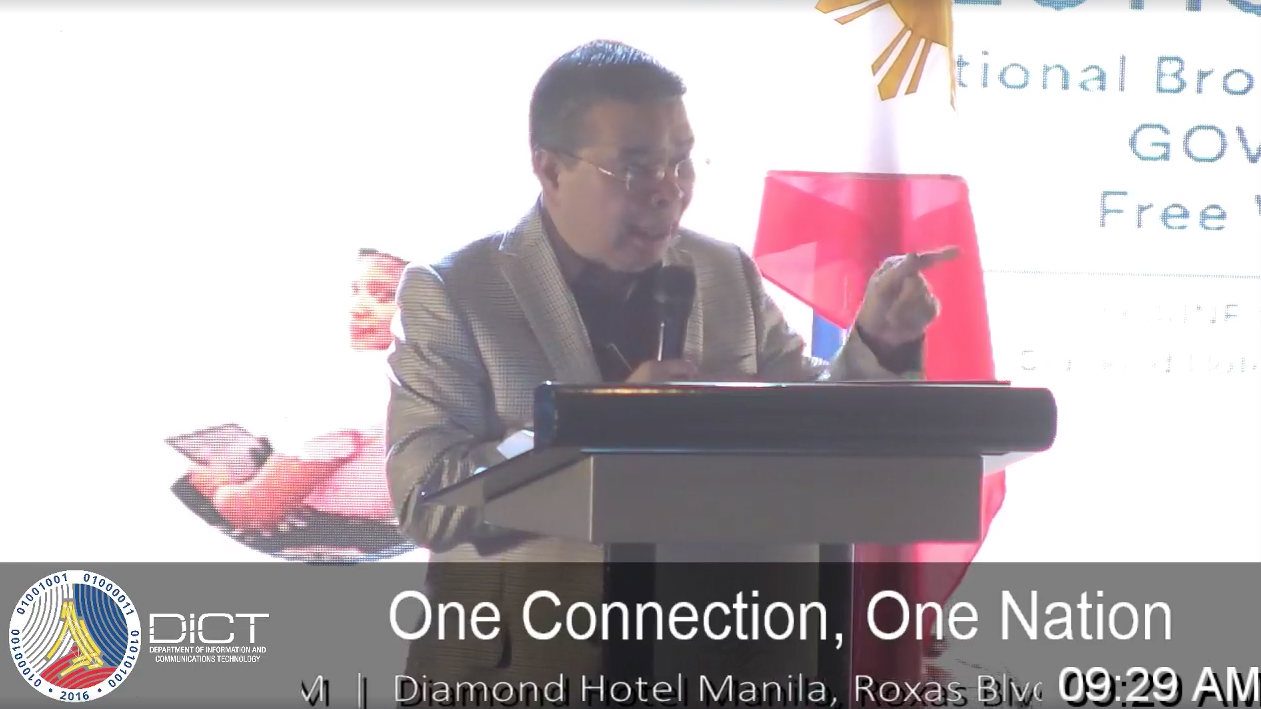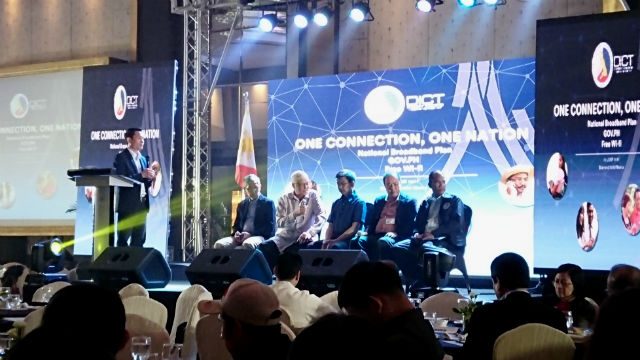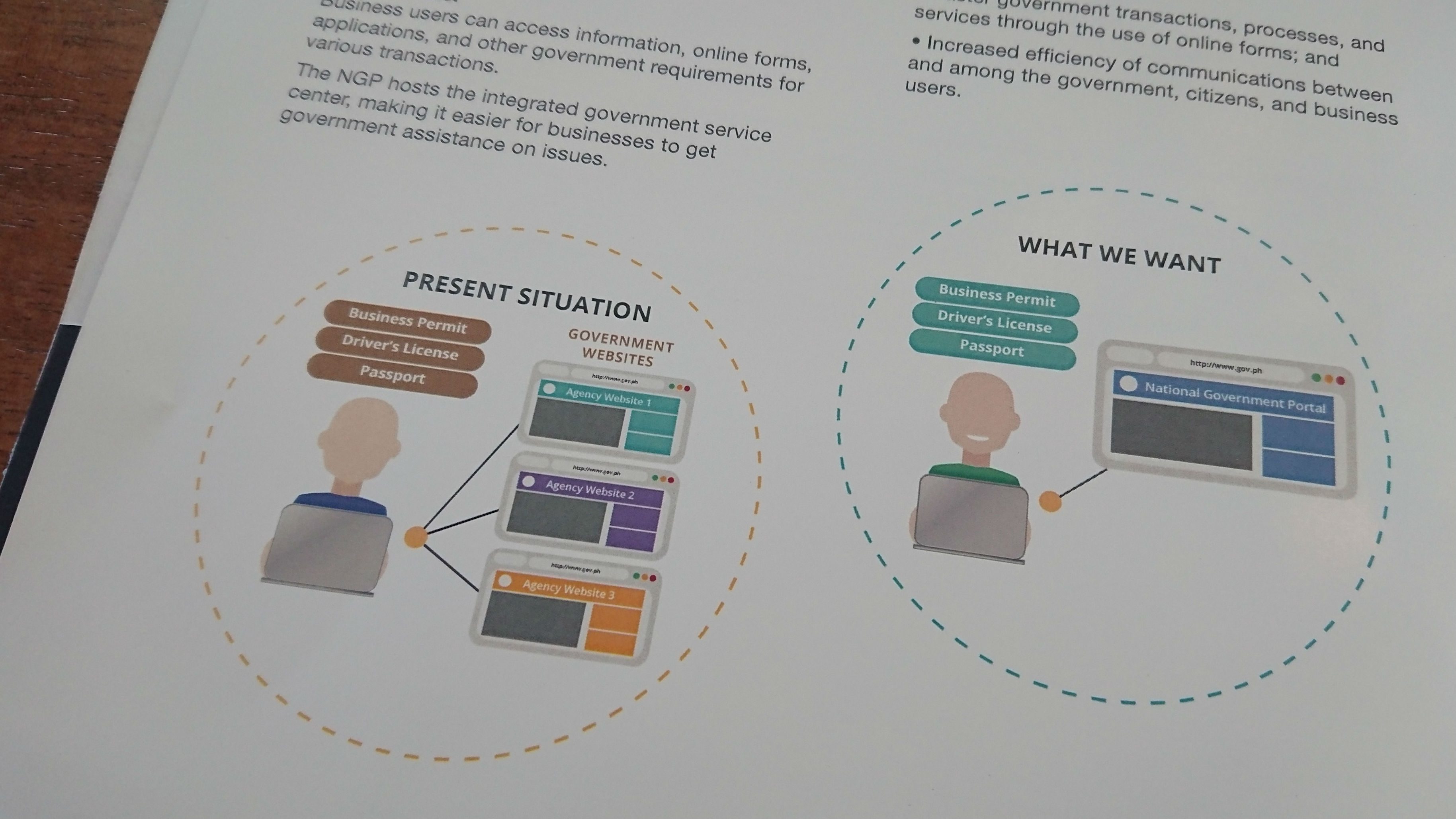SUMMARY
This is AI generated summarization, which may have errors. For context, always refer to the full article.

MANILA, Philippines – “I will not budge an inch.”
Department of Information and Communications Technology (DICT) Secretary Rodolfo A. Salalima issued this statement on Friday, June 23 in relation to the implementation of the government’s Free Wi-Fi Internet Access in Public Places Project, also know as Pipol Konek.
He spoke at the “One Connection, One Nation,” an event that served as a reintroduction of the DICT’s 3 flagship projects: Pipol Konek, the National Government Portal (NGP), and the National Broadband Plan (NBP). The livestream of the event (part 1) appears above. Part 2 is here.
Salalima recalled the gauntlet of hurdles the free Wi-Fi project on Epifanio de los Santos Avenue (EDSA) faced, particularly the requirement to secure permits from local government units (LGUs).
It can be recalled the country’s telecommunications companies have been pointing to the difficulties in getting permits from concerned LGUs when they implement projects. (READ: Free Wi-Fi projects slowed down by delayed LGU permits)
The DICT’s answer: “We will use the strength of government but, in using the strength of government, we will respect the rights of the people,” the DICT chief said. The free Wi-Fi on EDSA, for the MRT riding public and other commuters, was implemented by the department on June 12, 2017, the Philippines’ 119th Independence Day. (READ: Does the Wi-Fi on EDSA work?)
As if he was sending a message to LGUs, Salalima reiterated his strong words before DICT partner organizations, government agencies and offices gathered for the event at Diamond Hotel Manila along Roxas Boulevard.
“This is a public service. This is a government where we do everything to promote the good of the people and, as long as we are promoting the good of the people, we will respect the constitutional rights of the people,” he emphasized.
Pipol Konek
Salalima said the EDSA free Wi-Fi will be the forerunner and model for the implementation of the Philippine-wide Pipol Konek.
Pipol Konek envisions free internet access in public places nationwide covering 13,024 areas in 1,489 municipalities and 145 cities. Here’s a breakdown of the beneficiaries:
- 4,568 public schools
- 3,173 public parks and plazas
- 2,277 government hospitals and rural health units (RHUs)
- 677 public libraries
- 1,557 national and local government offices
- 682 state universities and colleges
- 90 airports, seaports, and train stations.
It will have 3 levels of access, with each tier assigning an amount of data one user can consume per day:
- Level 1, 50MB
- Level 2, 100MB
- Level 3, 300MB
For each level, users are also assigned monthly caps of 1GB, 2GB, and 3GB.
Users may instantly access Level 1 without registering; Level 2 requires users’ registration through one’s email address; Level 3 (still under development and not live yet), requires users to register through a Public Key Infrastructure (PKI) application.
The DICT said the scale of Pipol Konek is the first in Southeast Asia for free public Wi-Fi.
It can be recalled that before the DICT’s creation, the Department of Science and Technology (DOST) through its ICT Office launched the government’s nationwide free Wi-Fi project in July 2015 with a three-year budget of P3 billion. (READ: Free Philippine Wifi initiative set for July)
Upon the creation of the DICT through Republic Act 10844, the ICT Office became its core organization, with a number of agencies falling under its wings. (READ: Aquino signs law creating DICT, restructuring DOTC)

Salalima told journalists the department picked up what the ICT Office started, meaning It continues the nationwide free Wi-Fi project, which was then called Juan Konek by DOST. He hopes more funds would be coming.
“We will do it, God willing,” he assured, telling LGUs to not delay “my project.”
The DICT stated it’s also banking on the free Wi-Fi project to achieve digital literacy for the country.
The National Government Portal
The DICT also outlined the benefits for citizens, government, and business of a single website for all web-based government content at Gov.ph. (READ: All-in-one PH gov’t services portal in the works)
A single government portal provides citizens convenience by going online to just one website for government information, transactions, and services, the DICT said.

For government, it cuts down operational and maintenance expenses as a result of a centralized management of the single website; it also provides government agencies access to the government common platform, giving way to inter-operation of applications and databases that in turn enables sharing of data, it added.
“The site also projects a unified online brand for government while harmonizing work processes, increasing government transparency,” the DICT said.
Its benefits for business covers access to information, online forms, applications, and other requirements from government related to various transactions.
Collectively, the DICT said the three projects are seen to to “facilitate the development of an ICT-enabled nation geared toward sustainable socio-economic growth.”
A World Bank study on broadband connectivity has been oft-cited, showing that “for every 10% increase in broadband connectivity results in a 1.38% increase in Gross Domestic Product (GDP).”
The National Broadband Plan
On the NBP, Salalima said: “I am happy to report our blueprint has been approved by the President on March 27.” (READ: What is the National Broadband Plan?)
The DICT chief said he hopes that when President Duterte delivers his second State of the Nation Address (SONA), “we will be able to report how many Wi-Fi areas were established.”
The department crafted the NBP to provide the blueprint for the country’s broadband infrastructure to interconnect government offices across the country as well as empower the citizens to gain access to telecommunication services, particularly in far-flung areas. (READ: ‘Faster, cheaper’ Internet via DICT’s national broadband plan)
The DICT and the Professional Regulation Commission (PRC) also announced that it entered into a partnership to help the latter in improving its database.
Salalima and PRC Chairman Teofilo Pilando Jr. signed a Memorandum of Agreement (MOA) at the event for a “Deduping and Matching Application” program, aimed at removing double entries of names and professionals who passed away. – Rappler.com
Add a comment
How does this make you feel?
There are no comments yet. Add your comment to start the conversation.